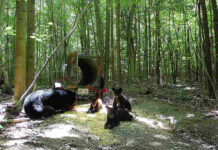As the 2020 fair season gets closer, no one seems to know what that season is going to look like.
Ohio will begin to lift some restrictions on businesses in early to mid May, Gov. Mike DeWine announced April 27. He said, however, restrictions on mass gatherings will be one of the last to be lifted.
The state has not yet provided a timeline on when that could happen.
Howard Call, executive director for the Ohio Fair Managers Association, told Farm and Dairy April 28 that OFMA will speak with a team responsible for reopening the state about Ohio fairs this week.
He said OFMA still thinks 4-H’ers and FFA members need to be able to complete their projects at the fairs this year, but acknowledged fairs may have to adjust based on social distancing guidelines.
Call said the OFMA plans to meet with county fairs on the 2020 fair season, beginning in the first or second week or May. He hopes to have more guidance from the state by then.
Only four weeks out from the start of some of the earliest fairs, however, Call said those meetings may not be very helpful for these early fairs.
“In my mind, eight weeks is a number,” Call said when asked how fair in advance most fairs need to make a decision.
Reopening
Call expects details on the state’s reopening to prompt some fairs to make that decision, since the early phases of reopening could offer some hints on the later phases.
For example, if the first two phases of the governor’s plan to reopen the state limits gatherings to no more than 50 people, he thinks, “phase three’s sure not gonna be 1,000 to 10,000.”
In his April 27 press conference, DeWine said that while some businesses will open in early to mid-May, gatherings of more than 10 people are still prohibited for now. He also noted that mass gatherings will be the last thing to reopen.
Changes and cancellations
The COVID-19 pandemic has caused many fairs to cancel off-season events and switch to virtual board meetings.
All Ohio 4-H in-person events through early July, and camps through the end of August, have been canceled. Pennsylvania 4-H suspended all in-person meetings, events and activities until further notice. Pennsylvania State University Extension also announced April 27 that all in-person, non-essential events and programs would be canceled, postponed or moved online through June 19.
Fairs bring in thousands of attendees each year. The Ohio State Fair’s attendance reached nearly 1 million in 2019.
Call said April 22 the association is advising fairs to follow DeWine’s guidance for this season. Since so much is unknown, he encouraged fairs to come up with a plan B — or even a plan C.
Junior fairs
The Paulding County Fair, which is scheduled to begin June 13, announced April 9 in a letter it will only have a junior fair this year. This means that many of its events, such as the demo derby, tractor pulls, rodeo and other entertainment, will not take place this year.
The letter noted that orders from the state have prohibited large gatherings, and that the fair is hoping these orders will be lifted by June. Fair organizers said that things are changing rapidly, but they are hoping to come up with ways to have the junior fair this year.
“It may not look the same, but we are doing everything we can to plan for it,” the letter read.
Call, however, noted that some fairs may not be able to afford to have junior fairs without other events.
“Grandstand shows generate a large amount of revenue,” he said. “Evening revenue helps pay for everything … we can’t put ourselves into bankruptcy.”
Lynette Dauch, president of the Harrison County Fair board, told Farm and Dairy April 24 the fair, which is scheduled to open in June, remains in a holding pattern until more direction comes from the state.
Farm and Dairy was unable to reach Dauch prior to press time, as to whether there was any change after DeWine’s April 27 announcement.
Virtual
Some fairs are considering alternative options for shows and sales. Call is also on the fair board for the Summit County Fair, which, he said, has talked to an auction house they work with about doing an online auction this year.
There has been some talk about virtual shows as well, but Call and some other fair managers believe it could be difficult for a judge to make decisions based on pictures instead of in-person.
“I’m skeptical on how that would work, having judged cattle shows myself,” Call said. “But, again, we’re not discounting that.”










